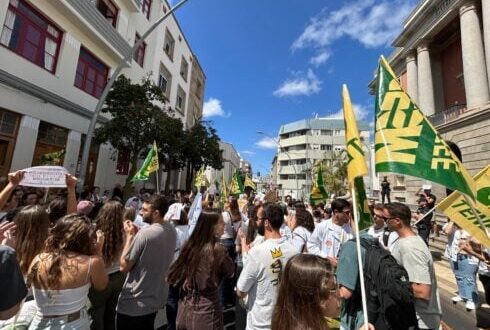SPANISH doctors downed tools today – the first nationwide strike in five years – as medics across the country protested what they describe as ‘precarious working conditions.’
Protesters in the Canary Islands carried banners reading ‘Exploited doctor, mistreated patient’ and ‘Deficient staffing, risk to patients.’
The government’s proposal to regulate working conditions for healthcare staff is at the core of the dispute.
The medical unions say it fails to recognise that medical work is unique and perpetuates the poor conditions which have been in place for decades.
READ MORE Summer to be ‘warmer than normal’ in Spain after fifth-wettest spring since 1961

Carmen Truyols is an anaesthesiology expert at a Madrid hospital. She delivered a damning evaluation of the current working conditions outside the Spanish Parliament.
“We continue in conditions not just from 2003, but from more than 50 years ago,” she told demonstrators, adding that doctors are working in what amounts to a ‘regime of slavery.’
In order to maintain patient safety, all non-urgent surgeries were suspended in participating hospitals. Emergency services continued to be provided.
One doctor at Vigo’s Álvaro Cunqueiro hospital confirmed that ‘all surgical interventions have been suspended except emergencies,’ with similar situations reported at medical centres nationwide.
READ MORE Spain’s PM Pedro Sanchez apologizes for the latest corruption scandal, but will not call early elections


In Spain, the strike was supported in different ways by various regions. Some areas reported participation rates of up to 95% while others had much lower numbers.
In the Valencia region, strike organisers claimed between 80 and 100% participation depending on the province, with Castellón seeing 90 % support, Alicante between 95 and 100%, and Valencia around 80%. The Balearic Islands reported ‘massive’ support with hospital participation reaching 85-90%.
In the Basque Country however, participation was significantly lower, with less than 10% of Osakidetza doctors participating.
The local medical union there said the call to strike had arrived ‘too late’ for proper organisation.
Doctors have expressed anger at proposed compulsory exclusivity requirements, particularly for doctors in their first five-years of public service and for department heads and coordinates.
READ MORE Carrefour plans to open 100 stores in Spain by 2025 and create 700 jobs


They argue this creates a professional classification system that ‘equates them with other graduates, devaluing the specific training and responsibility of their profession.’
Medical professionals are also disappointed by the absence of any mention of retirement regulations or the counting on-call time for pension purposes. These issues have long been a concern for hospital staff who are overworked.
Health Minister Mónica García has defended the proposed statute, claiming it ‘will respond to the needs of professionals’ whilst keeping dialogue open with all unions.
The intensity of yesterday’s protests suggests that the medical profession is still adamantly opposed to the idea.
The dispute is supported by more than just the unions on strike. The Medical Profession Forum, a group of major sector organisations, including the General Council of Official Medical Colleges (GCOM) and the Spanish Federation of Medical Scientific Associations, has also lent its support.
The strike is a reminder to foreigners who live in Spain and rely on its public healthcare system that there are ongoing pressures at the Spanish health care system which could impact service quality.
The medical unions want not only to improve working conditions, they also want to reduce the number of hours per week, have a better balance between work and life, as well as be recognized for their demanding work.
Yesterday’s strike was a major escalation of the dispute in Spain over working conditions for healthcare professionals. The last national doctor’s strike occurred five years ago.
 Costa News Spain Breaking News | English News in Spain.
Costa News Spain Breaking News | English News in Spain.







